
Almost 140 industry delegates are attending today's Office for Nuclear Regulation (ONR) Annual Conference for an in-depth analysis of the regulatory landscape across Great Britain's nuclear sector.
The conference is a valuable opportunity for ONR to engage constructively with a broad cross-section of industry stakeholders and to outline regulatory priorities for the year ahead.
Representatives from the Nuclear Decommissioning Authority, Urenco UK Ltd, NNB GenCo, EDF, BAE Systems, Nuclear Restoration Services Limited, Rolls-Royce Submarines Ltd and Sellafield and many other dutyholders have come together to the Royal Society headquarters in London for a busy conference agenda.
Live blog
Summary and reflections from Judith Hackitt, ONR's Interim Chair
4PM

Judith Hackitt, ONR's Interim Chair, brings the conference to a close with her overall reflections and summary of the day.
And that's the end of ONR's annual conference for 2024 which featured some thought-provoking discussions and an open and honest exchange of views about the industry and our regulation during the past 12 months and the challenges facing us in the years ahead.
Thanks to all those who attended and participated, and we hope that you found it useful to read the updates from the day on our live website blog.
Q&A with senior ONR leaders
3:45PM
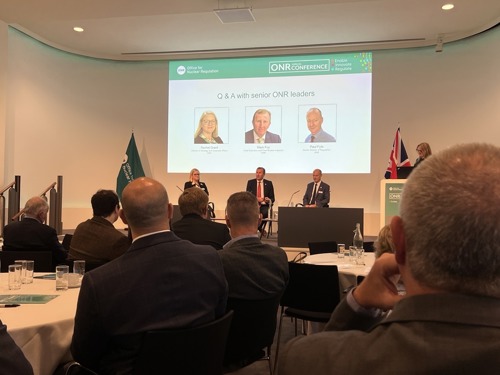
We're now onto a question and answer session with senior ONR leaders - Mark Foy, Paul Fyfe and Rachel Grant, Director of Strategy and Corporate Affairs.
The first question is about international leveraging for reactor designs and the concept of relying on the assessment work of global regulators.
Mark Foy: "We have a front and centre role in instilling confidence in nuclear within communities....in simple terms, explaining why it can be safe for a particular technology to be used in a particular locality."
Another question is asked about the balance of diversity within ONR and what can be done to improve this across the industry.
MF: One of the challenges is the pipelines...we are talking about tens of thousands of people coming into nuclear during the forthcoming years. When I look at ONR now, it is a real rich and diverse mix of individuals; it's great to see but the journey has to continue."
RG: We need to make it exciting for people to consider nuclear as a career and also think hard about making this industry as relevant for people in terms of work and jobs. Also those at a mid-career point...we see people rise to a certain level and then it stops or slows, so what is causing this? We need to make sure we are doing what we can about flexible working....it's a continuing conversation."
ONR priorities for next half decade
2.55PM

The next topic for the roundtable discussion deals with the question: What do you think ONR's priorities should be for the next five years?
Points were made within the groups about the need for more growth in innovative solutions within the sector and the different facets of an enabling approach to regulation.
Roundtable discussion - strategic horizons; the next ONR chapter
2.25PM
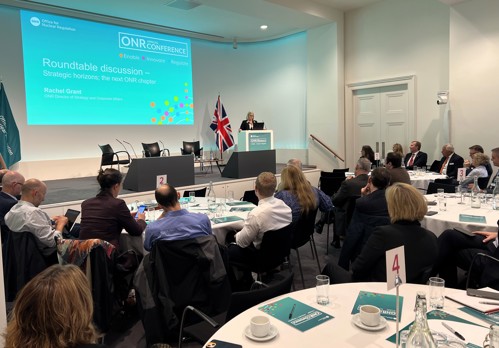
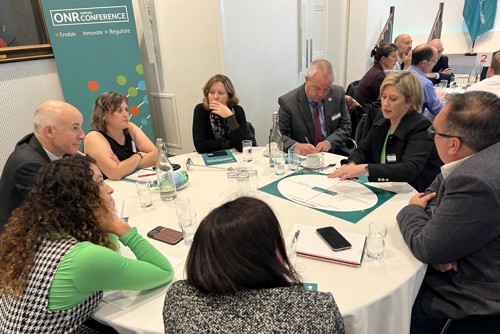
A roundtable discussion is underway about how ONR is modernising its regulation, with analysis of strengths (what are we doing well?), weaknesses (where can we improve?), opportunities (what should are goals be/are demands shifting?) and threats (what are our blockers/what are factors outside of our control?).
We're now getting feedback from conference delegates after a 15 minute session on each table.
Artificial intelligence and avatars....
1.52PM

Our industry conference is now back after lunch, and next up is Paul Fyfe, our Senior Director of Regulation, speaking about how we are modernising our regulation.
Or is it really Paul Fyfe?!
This section begins with an AI-generated avatar of Paul (looking startlingly lifelike!) speaking about how we are pursuing innovation within our regulation so it remains fit for purpose for a rapidly changing and growing sector.
Paul: "What I can say is, you have an ONR who is hungry to modernise in a way that we perhaps haven't done before."
Up to 140 external delegates in attendance at the conference
12:18PM

Representatives here at the Royal Society today include the Nuclear Decommissioning Authority, Urenco UK Ltd, NNB GenCo, EDF, BAE Systems, Nuclear Restoration Services Limited, Rolls-Royce Submarines Ltd, Sellafield Ltd and many others.
The conference is now breaking for lunch; we'll be back at about 1:15pm.
Key update - Takeaways from CNI annual report
12:04PM
Some key takeaways from Mark Foy's speech earlier, and his round-up of his Chief Nuclear Inspector's Annual Report:
- GB's nuclear industry continues to focus on achieving good performance, which overall remains satisfactory.
- the journey to improve nuclear site health & safety performance and cyber must continue, and needs collective leadership.
- ONR is pleased to see the improvements in sites under enhanced regulatory attention etc.
- the need to deliver the skills and capability to meet the government's nuclear ambitions.
- ONR attention on the planning for the whole life cycle management of nuclear facilities - existing and new.
- adopting and enabling modernisation/innovation is increasingly part of ONR's DNA.
- ONR will seek to enable, innovate and regulate.
50 years of ALARP - panel session
11:40AM

We've finished a quick refreshment break and are now back with the first panel session of the day.
This is focusing on 50 years of ALARP: Shaping safety for the next half-century; with contributions on stage from Shane Turner - ONR's Technical Director, Katrina McLeay, Deputy Director, Nuclear Safety and Resilience from DESNZ and Jane Lassey, Director of Regulation, Health and Safety Executive.
This session examines the 'as low as reasonably practicable' principle (ALARP) which is a fundamental requirement of UK health and safety legislation and the bedrock of standards across the nuclear industry.
'The role of ONR is essential for maintaining public confidence in future nuclear sites' - Lord Hunt
11:31AM
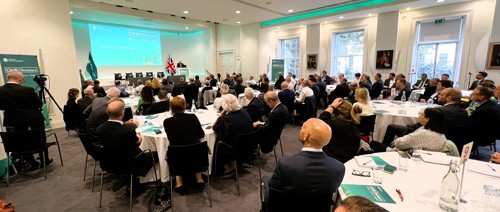
 [(l to r) Mark Foy, Lord Hunt and ONR Interim Chair Judith Hackitt]
[(l to r) Mark Foy, Lord Hunt and ONR Interim Chair Judith Hackitt]
Lord Hunt said: "The role of the ONR is essential not just for addressing the issues of the past, but for maintaining public confidence in future nuclear sites as we pursue net zero.
"Robust, proportionate regulation is vital; it helps to drive investment into our new nuclear projects. It enables good projects to progress quickly and safely. And it builds public confidence in this remarkable technology.
"I am grateful for the work that ONR does to ensure that our nuclear industry is safe and secure."
Lord Hunt addresses the industry conference
11:25AM
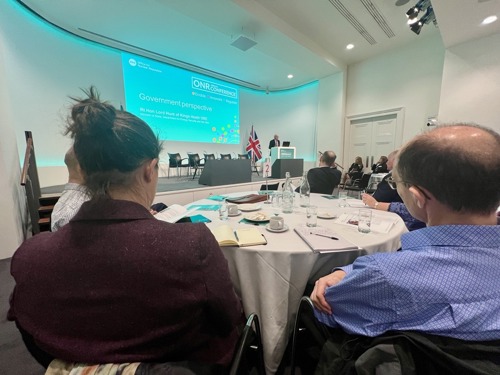
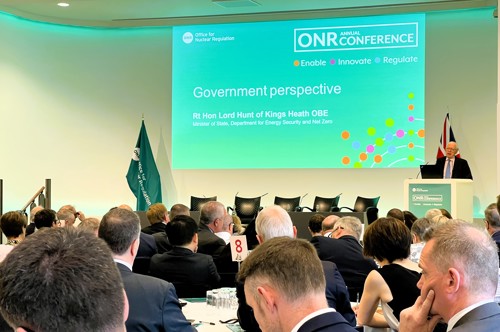
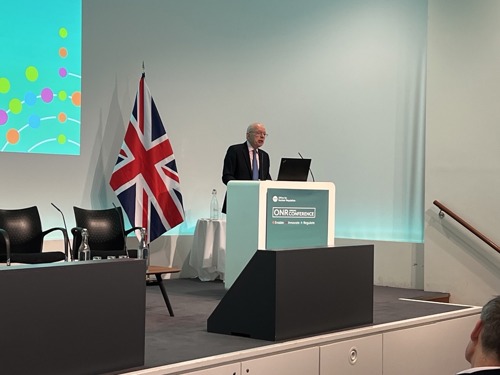
Key update - Lord Hunt, Minister of State, Department for Energy Security and Net Zero (DESNZ) takes to the stage
11.15AM
Lord Hunt speaks of his very busy first months in the job with visits to the Hinkley Point C site in Somerset, Sizewell B and the proposed Sizewell C site, as well as representing the UK at the International Atomic Energy Agency’s conference in Vienna.
The Minister also recounts his recent visit to Sellafield, hailing the 'remarkable' difference now observed at the site since his last time in Cumbria, about 15 years ago, with significant progress made in decommissioning, advanced robotics in use and the ongoing Sellafield work helping to design safer nuclear power stations in the future.
2024 - Tenth anniversary since ONR's vesting
11:09

Mark finishes by reflecting on the tenth anniversary since ONR vested in 2014, recalling the recent all-staff event in June, with growth made in its people, purposes and culture on the journey to becoming increasingly modern in terms of governance, processes and regulation.
He also mentions ONR's ongoing steps towards an enabling regulation philosophy and the essential feedback gained from peer reviews and engagements with all of our stakeholders.
Good practices and positive progress achieved during past year
10.55AM

Good practices:
- Managing Counterfeit, Fraudulent, and Suspect Items (CFSI) within the supply chain by NNB GenCo
- deploying artificial intelligence and robotics at Sellafield, to reduce risk exposure
Positive progress:
- Rolls-Royce SMR design completed GDA Step 2 (July 2024)
- significant infrastructure developments at major defence sites
- Devonport Royal Dockyard Limited; improved leadership and management for safety
- AWE Aldermaston, steady improvement in performance
- advanced Gas-cooled Reactor; lifetime extension, defueling and transition to NRS
- closure of long-standing Regulatory Issues and progress on the Sellafield Security Enhancement Programme (SSEP)
- collaboration on cyber security
- Berkeley; security plan and adequate security outcomes
Regulatory priorities for the year going forward
10:42AM

Mark highlights our key focuses for the 2024-25 year.
- promoting improvement at sites in enhanced attention
- addressing legacy risks – ponds and silos, Sensitive Nuclear Material
- enabling major infrastructure project delivery
- industry whole lifecycle planning and management
- risk informed and targeted engagements (RITE)
- building/maintaining regulatory capacity & capability
He also touches on the ongoing CNI themed inspection on climate change, which seeks assurances from the industry that it:
- understands and has taken account of recent climate change projections in relevant safety cases and hazard definitions
- is able to demonstrate that activities are and will remain safe and secure in the future subject to the reasonably foreseeable effects of climate change
- has effective arrangements to monitor and review climate change information to determine if additional measures are needed to ensure that activities remain protected in the future.
Key regulatory themes from 2023
10.32AM
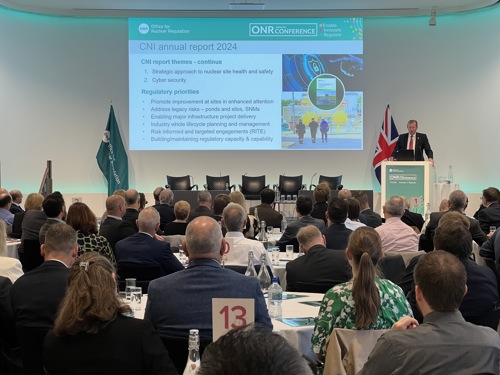
Mark speaks of how nuclear site health and safety remains a priority, with the past 12 months showing an increase in the number Reporting of Injuries, Diseases and Dangerous Occurrences Regulations (RIDDOR) reports on previous year.
20% of reportable incidents are still of high potential and cross sector leadership and strategic action is needed to address this, he adds.
Investigations remain ongoing into the fatalities at the Hinkley Point C site and the Atomic Weapons Establishment (AWE).
Chief Nuclear Inspector's opening address
10.15AM
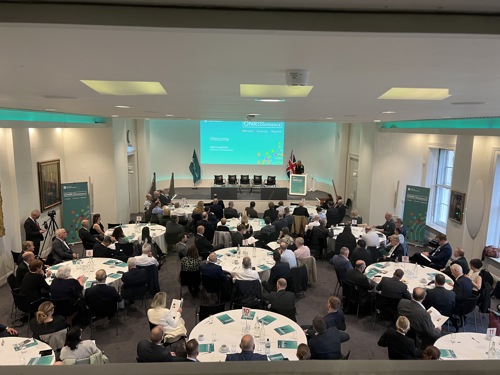
Our conference has now kicked off with a welcome from our Head of Communications Jane Loughran.
Mark Foy, our Chief Executive and Chief Nuclear Inspector (CNI), next takes to the stage to give the opening address, including reflections on his recently-published CNI annual report.
That report found that overall performance of the nuclear industry in 2023/24 remained satisfactory, with:
- inspections confirming good levels of compliance
- on the whole, the industry continuing to meet the high standards of safety, security, and safeguards
- steady improvements at sites under enhanced and significantly enhanced attention
- work and effort invested to influence improvements
- some variations in performance
- small increase in higher significance event